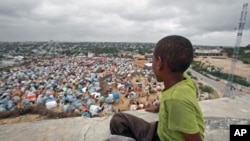Title: Kenya - Horn of Africa - Summit
HEAD: Somalia Asks Neighbors for Security Help at Regional Summit
DATE: 09/08/11
BYLINE: Gabe Joselow
DATELINE: Nairobi
NUMBER: 1350561
TYPE: CR
VOA East Africa Correspondent Gabe Joselow reports.
teaser: Somali Prime Minister Abidweli Mohamed Ali calls on countries to band together to combat al-Shabab, famine and war
keywords: Somalia, al-Shabab, regional summit, Nairobi, Horn of Africa, Africa, United Nations headquarters, Kenya, Ethiopia, al-Qaida-linked militant group, war, famine, drought, Transitional Federal Government, Somali Prime Minister, Abidweli Mohamed Ali
description: Delegates from around the world met Thursday in Nairobi for the start of a two-day summit on confronting the drought crisis in the Horn of Africa. Somalia's prime minister called on nations in the region to work together to help his country overcome the devastating effects of famine and war.
caption: A boy sits looking over the Seyidka settlement for the famine stricken internally displaced people in Berkulan near Somalia's capital, Mogadishu, September 6, 2011.
Somalia Asks Neighbors for Security Help at Regional Summit
Delegates from around the world met Thursday in Nairobi for the start of a two-day summit on confronting the drought crisis in the Horn of Africa. Somalia's prime minister called on nations in the region to work together to help his country overcome the devastating effects of famine and war.
At a morning session of the high-level summit at the United Nations headquarters in Nairobi, delegates from the Horn of Africa discussed ways to bolster security in Somalia.
Somali Prime Minister Abidweli Mohamed Ali, addressing the session, blamed the al-Qaida-linked militant group al-Shabab as being “primarily responsible” for the famine, and a major burden to neighboring countries.
“The insecurity the group has created in the south of Somalia has led to a large influx of refugees into Kenya and Ethiopia, straining resources and spreading instability across the region," said Ali. "It is therefore clear that conflict, hunger and instability in one country has an impact across the entire region.”
Al-Shabab, which has been fighting against the Transitional Federal Government of Somalia for several years, has impeded access to areas hit by famine, making it dangerous or impossible for aid workers to reach those in need.
The Somali government, backed by African Union [AU] forces, recently forced al-Shabab to withdraw its fighters from the capital, Mogadishu. Prime Minister Ali said more forces are needed, however, to secure the country going forward.
"Ladies and gentlemen, Somalia has taken great steps on the road to lasting peace, but as noted earlier, no nation can do this by itself. Though we are grateful for the support of fellow African countries within the AU, and that of the international community at large, more, in terms of men and equipment, will be required if we are to completely eliminate the extremist threat,” he said.
The delegate for Djibouti said at the summit that his country would deploy a battalion to fight along side AU forces in Somalia, joining troops already contributed by Uganda and Burundi.
Heads of state are expected to join the summit on day two, Friday, including the presidents of Tanzania, Djibouti and South Sudan. United Nations officials also will take part.
The Kenya government says the key outcome of the meeting will be a “Nairobi Action Plan” detailing specific actions each country will take to find immediate and long-term solutions to the Horn of Africa crisis.
(Signed)
NEB/GJ/PLM
Delegates from around the world met Thursday in Nairobi for the start of a two-day summit on confronting the drought crisis in the Horn of Africa. Somalia's prime minister called on nations in the region to work together to help his country overcome the devastating effects of famine and war.
At a morning session of the high-level summit at the United Nations headquarters in Nairobi, delegates from the Horn of Africa discussed ways to bolster security in Somalia.
Somali Prime Minister Abidweli Mohamed Ali, addressing the session, blamed the al-Qaida-linked militant group al-Shabab as being “primarily responsible” for the famine, and a major burden to neighboring countries.
“The insecurity the group has created in the south of Somalia has led to a large influx of refugees into Kenya and Ethiopia, straining resources and spreading instability across the region," said Ali. "It is therefore clear that conflict, hunger and instability in one country has an impact across the entire region.”
Al-Shabab wreaks havoc
Al-Shabab, which has been fighting against the Transitional Federal Government of Somalia for several years, has impeded access to areas hit by famine, making it dangerous or impossible for aid workers to reach those in need.
The Somali government, backed by African Union (AU) forces, recently forced al-Shabab to withdraw its fighters from the capital, Mogadishu. Prime Minister Ali said more forces are needed, however, to secure the country going forward.
"Ladies and gentlemen, Somalia has taken great steps on the road to lasting peace, but as noted earlier, no nation can do this by itself. Though we are grateful for the support of fellow African countries within the AU, and that of the international community at large, more, in terms of men and equipment, will be required if we are to completely eliminate the extremist threat,” he said.
Determining a plan
The delegate for Djibouti said at the summit that his country would deploy a battalion to fight along side AU forces in Somalia, joining troops already contributed by Uganda and Burundi.
Heads of state are expected to join the summit on day two, Friday, including the presidents of Tanzania, Djibouti and South Sudan. United Nations officials also will take part.
The Kenya government says the key outcome of the meeting will be a “Nairobi Action Plan” detailing specific actions each country will take to find immediate and long-term solutions to the Horn of Africa crisis.
